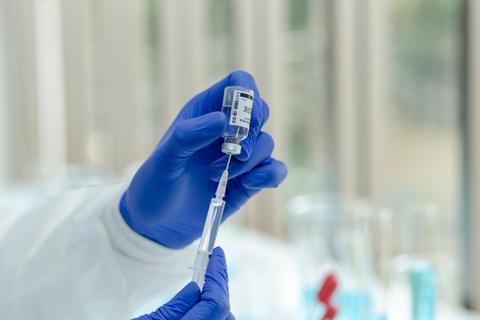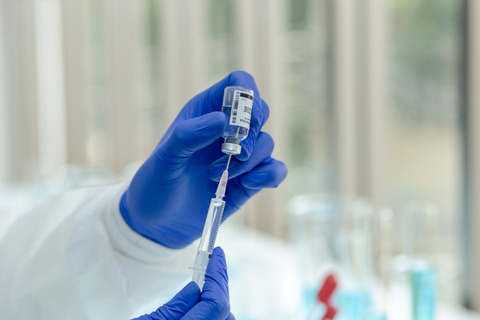

Weeks – let that sink in for a moment.
CNN notes that Moncef Slaoui, the head of the US government's effort to develop a vaccine against COVID-19, said the first Americans to receive a vaccine -- if all things go according to plan -- could be as early as the second week of December, with 40 million doses expected to be available in the U.S. by the end of December. However, the CDC’s Dr. Sara Oliver adds, the vaccine will not be available to everyone right away.
“We expect a constrained supply environment,” Oliver said. She pointed out that the CDC expects between 5 million and 10 million doses will become available each week for the first few months as vaccine makers ramp up manufacturing.
That means the Advisory Committee on Immunization Practices (ACIP) may need to designate sub-groups to receive priority for vaccination, she said. (These might initially include healthcare workers and higher-risk individuals).
Two companies – Pfizer and Moderna – have applied for EUA from the FDA for coronavirus vaccines. The Pfizer vaccine ihas already been approved for use in the UK.
And no matter where the vaccine becomes available first, its release was welcome news – particularly since COVID has become as much a political issue as a health and economic threat.
An initial announcement on November 9 from Pfizer, noting its success with a vaccine in trials, set off a chain reaction of optimism – and concern – in the sports, travel and hospitality industries. Specifically, people were asking, could event owners require the vaccine? Would they?
It’s hard to know for sure. However, there are some early indicators that COVID vaccination and precautions will play an enormous role in the widespread restart of live events.
The question was set to MLB by the Los Angeles Times, which noted that the projected availability of the vaccine would (more or less) coincide with the start of baseball season. Specifically, reporters asked, could players be required to take the vaccine?
The answer appears to be no, but the league and the players’ union could reach such an agreement. The league declined to comment on the matter immediately, but union chief Tony Clark said he is hopeful that vaccines become viable enough to warrant a negotiation with MLB for a vaccine protocol.
“At this point, we simply remain optimistic that there is a tangible opportunity to have that discussion at the beginning of next year,” Clark said.
The issue is complex, taking in legal and ethical issues. But another aspect nobody can overlook is economic. And, the L.A. Times noted, the widespread availability of a vaccine also would brighten the financial outlook for a league that Commissioner Rob Manfred has said generates about 40 percent of revenue from game days: ticket sales, parking, concessions and merchandise.
The Dodgers lost “well north of $100 million” this year, team President Stan Kasten told the CNBC Evolve conference. He said the Dodgers are planning for “full stadiums” next season.
“Opening day is a good four or five months away, and hopefully there will be progress on getting the rates of infection in hand,” Kasten said. “Hopefully, by then, we will have one or more vaccines available to help make it even safer for fans to come.
The big picture scenario – full stadiums and healthy fans – is a great one. But what about individuals who refuse to get vaccinated?
According to Billboard, USA-based ticket sales and distribution company Ticketmaster has already noted that it “has been working on a framework for post-pandemic fan safety that uses smart phones to verify fans' vaccination status or whether they've tested negative for the coronavirus within a 24 to 72 hour window.”
And while it’s obvious that not all sports events will use Ticketmaster, the plan provides a precedent for event owners:
According to Billboard, many details of the plan will rely on three separate components -- the Ticketmaster digital ticket app, third party health information companies like CLEAR Health Pass or IBM's Digital Health Pass and testing and vaccine distribution providers like Labcorp and the CVS Minute Clinic.
If approved, the process would be that after purchasing a ticket for an event, the buyer would need to verify that he or she has been vaccinated (which would provide approximately one year of COVID-19 protection) or test negative for coronavirus approximately 24 to 72 hours prior to the event – although that time frame could vary, depending upon local guidance.
And, Billboard adds, once the test was complete, the fan would instruct the lab to deliver the results to their health pass company, like CLEAR or IBM. If the tests were negative, or the fan was vaccinated, the health pass company would verify the attendee's COVID-19 status to Ticketmaster, which would then issue the fan the credentials needed to access the event. If a fan tested positive or didn't take a test to verify their status, they would not be granted access to the event. There are still many details to work out, but the goal of the program is for fans to take care of vaccines and testing prior to the concert and not show up hoping to be tested onsite.
Those who are concerned about privacy, according to Ticketmaster, will be interested in Ticketmaster's statement that it would not store or have access to medical records and would only receive verification of whether a ticket purchaser is cleared to attend an event on a given date.
Marianne Herman, co-founder and principal of reBUILD20, told Billboard that “In order for live events to return, technology and science are going to play huge roles in establishing integrated protocols so that fans, artists, and employees feel safe returning to venues. Integrating ticketing platforms with the guests verified testing results is one key way to reimagine how we’re going to get fans back to live events. The experience of attending live events will look completely different, but innovation married with consistent implementation will provide a framework to get the live sports and event industry back to work.”
And while a vaccine will certainly impact everything from professional sports to rock concerts, the biggest stage for sports – the Olympics – is looming, and organizers, as well as athletes, are hoping for a vaccine that will allow international fans to attend, and for large-scale crowds to be present.
Elinor Barker, who was part of the British team that won gold in the team pursuit at Rio 2016, toldInside The Games that says she is hopeful that the possibility of a coronavirus vaccine being widely available next year will "save" the summer Olympics in Tokyo next year.
"Having spectators present is largely what the Olympics is about for us," Barker said, as reported by BBC Sport Wales. "Being on the biggest stage in the world wouldn't really feel the same if we were competing in empty stadiums. It would be really bizarre, so fingers crossed this vaccine is going to save the Olympics next year to some extent."
IOC President also Thomas Bach told reporters said he was "more and more confident" of fans being able to attend Tokyo 2020.
The big question, of course, doesn’t have anything to do with the Olympics and is, in fact, much closer to home. How will the vaccine filter down to youth sports? Will parents get their children vaccinated? Will youth sports require they do, or will they work with third-party organizations like Ticketmaster to use scenarios where children must either test negative for COVID or have the vaccine in order to participate in a tournament? What happens to parents who need to travel to a tournament, and whose test is taken outside the time window required for a tournament?
And even more importantly, what is to be done about anti-vaxxers, who oppose inoculation?
These are all questions that will face the sports tourism industry in the months to come. It will behoove event owners to ready themselves for this.
And just as a side note: There will be a great benefit in being the company that develops a third-party app that is approved by the FDA and recognized by youth sports organizations, when it comes to making these plans.
The hospitality industry, whose fortunes are tied to those of tourism (sports tourism being no exception) rejoiced at the announcement of a vaccine. According to Travel Agent Central, shares in Marriott International rose by 21 percent, with Expedia Group up 22.5 percent and Park Hotels & Resorts rising by 40 percent on the news.
Hugh Taylor OBE, CEO, Michels & Taylor, a hotel asset management, consultancy and management company told, Hospitality Insights: “The news on a potential vaccine is a huge boost to the hospitality industry. The problems we have been facing since March have not just been confined to ensuring our hotels are safe to welcome our guests but have also focused on trying to convince them that it’s ok to travel and stay with us. Ultimately the future of the industry comes down to rebuilding consumer confidence in our hotels, and a proven vaccine will be a massive help in securing that confidence.”
Restaurant Business noted the announcement of a vaccine “sent stocks soaring.” The food and beverage industry has been particularly hard-hit by COVID. And among the stocks that surged were casual dining chains, such as those frequented by traveling teams: Darden (up 14%), Dine Brands (19%), Brinker International (11%), Texas Roadhouse (15%), Ruth’s Chris Hospitality Group (26%), Bloomin' Brands (17%), Cracker Barrel (22%), BJ's Restaurants (28%) Cheesecake Factory (23%) and Denny’s (29%). Dave & Buster's, the eatertainment concept, also went up by 33%.
While there is no perfect scenario when it comes to mandating or recommending vaccines, tournament directors should recall that large gatherings have previously been linked to everything from mumps to the flu – and everything in between, including measles, all of which have a vaccine available.
America's confidence in attending sports events, upon which hinges the continuing restart of the sports travel economy as a whole, appears to be closely tied to the availability of a vaccine. SGB Media has noted that even with wearing personal protective equipment and staying socially distanced, 67 percent of Americans surveyed said they would not attend an indoor sporting event without a COVID-19 vaccine, that according to a poll conducted by Seton Hall University’s Sharkey Institute. And fifty-eight percent of respondents said they would not attend an outdoor event under the same circumstances. In a separate survey, only 27 percent of Americans said they would attend a sports events in the next six months, citing concerns such as crowding and a widespread lack of people taking precautions.
SDM’s current poll is asking readers what impact they think the presence of a vaccine will have upon the continuing rebound of the sports tourism industry; to take the poll, click here.

